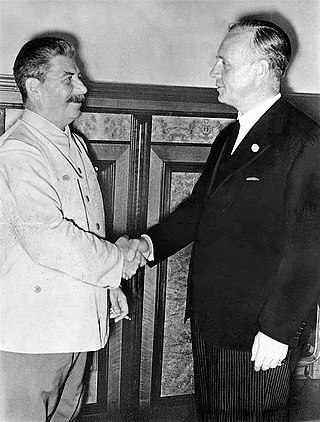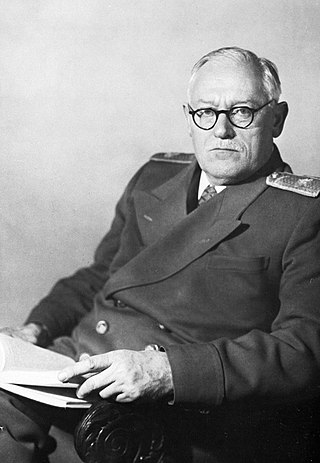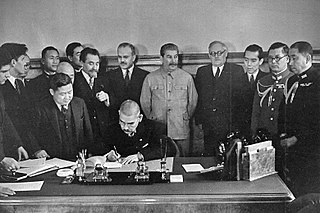Molotov or Molotow may refer to:
Contents
- Vyacheslav Molotov (1890–1986), Soviet politician and diplomat, and foreign minister under Joseph Stalin
- Molotov cocktail, hand-held incendiary weapon
Molotov or Molotow may refer to:

The Molotov–Ribbentrop Pact, officially the Treaty of Non-Aggression between Germany and the Union of Soviet Socialist Republics, and also known as the Hitler–Stalin Pact and the Nazi–Soviet Pact, was a non-aggression pact between Nazi Germany and the Soviet Union, with a secret protocol establishing Soviet and German spheres of influence across Northern Europe. The pact was signed in Moscow on 23 August 1939 by German Foreign Minister Joachim von Ribbentrop and Soviet Foreign Minister Vyacheslav Molotov.

Vyacheslav Mikhaylovich Molotov was a Soviet politician, diplomat, and revolutionary who was a leading figure in the government of the Soviet Union from the 1920s to the 1950s, as one of Joseph Stalin's closest allies. Molotov served as Chairman of the Council of People's Commissars from 1930 to 1941, and as Minister of Foreign Affairs from 1939 to 1949 during the era of the Second World War, and again from 1953 to 1956.

Andrey Yanuaryevich Vyshinsky was a Soviet politician, jurist and diplomat.

The Soviet–Japanese Neutrality Pact, also known as the Japanese–Soviet Non-aggression Pact, was a non-aggression pact between the Soviet Union and the Empire of Japan signed on April 13, 1941, two years after the conclusion of the Soviet-Japanese Border War. The agreement meant that for most of World War II, the two nations fought against each other's allies but not against each other. In 1945, late in the war, the Soviets scrapped the pact and joined the Allied campaign against Japan.

Polina Semyonovna Zhemchuzhina was a Soviet politician and the wife of the Soviet foreign minister Vyacheslav Molotov. Zhemchuzhina was the director of the Soviet national cosmetics trust from 1932 to 1936, Minister of Fisheries in 1939, and head of textiles production in the Ministry of Light Industry from 1939 to 1948. In 1948, Zhemchuzhina was arrested by the Soviet secret police, charged with treason, and sent into internal exile, where she remained until after the death of Joseph Stalin in 1953.
Shvernik Commission was an informal name of the commission of the CPSU Central Committee Presidium headed by Nikolay Shvernik for the investigation of political repression in the Soviet Union during the period of Stalin. Other members were Alexander Shelepin, Zinovy Serdyuk, Roman Rudenko, Olga Shatunovskaya, Nikolai Mironov, and Vladimir Semichastny.
Joseph Stalin (1878–1953) was a Bolshevik revolutionary and the second leader of the Soviet Union from the mid-1920s until his death in 1953.

The State Defense Committee was an extraordinary organ of state power in the Soviet Union during the German-Soviet War, also called the Great Patriotic War, with complete state power in the country.
The 18th Congress of the Russian Communist Party (Bolsheviks) was held during 10–21 March 1939 in Moscow. It elected the 18th Central Committee.
The Iosif Stalin-class passenger ship was a two-ship class of large turbo-electric powered passenger ships, operated by the Soviet Baltic Sea Shipping Company (BGMP). The ships were taken over by the Soviet Navy during World War II and used as transport vessels. The class was named after Joseph Stalin.

The Chairman of the Council of People's Commissars of the Soviet Union was the head of government of the Soviet Union during the existence of the Council of People's Commissars of the Soviet Union from 1923 to 1946.

World War II Behind Closed Doors: Stalin, the Nazis and the West is a 2008 six-episode BBC/PBS documentary series on the role of Joseph Stalin and German-Soviet relations before, during, and after World War II, created by Laurence Rees and Andrew Williams.

Vyacheslav Alekseyevich Nikonov is a Russian political scientist.

Nikolai Alexandrovich Bulganin was the Premier of the Soviet Union from 1955 to 1958. He also served as Minister of Defense, following service in the Red Army during World War II.
The Nineteenth Congress of the Communist Party of the Soviet Union was held from 5 to 14 October 1952. It was the first party congress after World War II and the last under Joseph Stalin's leadership. It was attended by many dignitaries from foreign Communist parties, including Liu Shaoqi from China. At this Congress, Stalin gave the last public speech of his life. The 19th Central Committee was elected at the congress.

Joseph Stalin, second leader of the Soviet Union, died on 5 March 1953 at his Kuntsevo Dacha after suffering a stroke, at age 74. He was given a state funeral in Moscow on 9 March, with four days of national mourning declared. On the day of the funeral, of the hundreds of thousands of Soviet citizens visiting the capital to pay their respects, at least 109 were later acknowledged to have died in a human crush.

"The Plot to Kill Stalin" was an American television play broadcast on September 25, 1958, on the CBS television network. It was the first episode of the third season of the anthology television series Playhouse 90. Delbert Mann was the director, and the cast included Melvyn Douglas as Joseph Stalin, Eli Wallach as Stalin's personal secretary, and Oskar Homolka as Nikita Khrushchev. It was nominated for two Sylvania Television Awards: as the outstanding telecast of 1958 and for Douglas as outstanding actor in a television program.

Pudim Molotov is a popular dessert in Portuguese cuisine. It is made with egg whites, sugar, and sometimes a touch of vanilla. The egg whites are whipped until stiff peaks form, then mixed with caramel sauce. The mixture is then baked in the oven, resulting in a light and fluffy dessert with a caramelized top.
Karpovsky, feminine: Karpovskaya is a Russian-language surname. Notable people with the surname include:

The German declaration of war on the Soviet Union, officially Note of the Ministry of Foreign Affairs of Germany to the Soviet government from 21 June 1941, is a diplomatic note presented by German Foreign Minister Joachim von Ribbentrop to Soviet ambassador Vladimir Dekanozov in Berlin on 22 June 1941 at 4 a.m. local time, informing him about the German invasion of the Soviet Union during World War II and preceding casus belli. Later in the morning of that day German ambassador to the Soviet Union Friedrich-Werner Graf von der Schulenburg presented the note to Soviet Foreign Minister Vyacheslav Molotov in Moscow. On the same day The New York Times published an abridged English translation of the declaration.